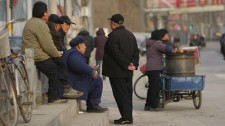 + Money (local currency, changing money, atm machines, credit cards, traveler’s cheques)
+ Money (local currency, changing money, atm machines, credit cards, traveler’s cheques)
Local currency:
Chinese currency is called Renminbi (RMB).The symbol for RMB is . The unit of RMB is a yuan and with smaller denominations called jiao and fen. The conversion among the three is: 1 yuan = 10 jiao =100 fen
Changing money:
Money exchange facilities for both currency and travelers’ cheques are available at major airports, hotels, and department stores. Exchange rates fluctuate in line with international financial market condition and are published daily by the State Exchange Control Administration.
Keep your currency exchange receipts because you will need to show them when you change RMB back to your own currency at the end of visit.
Credit Card and ATMs
At present, the following credit cards are accepted in China: Master Card, Federal Card, Visa, American Express, JCB, and Diners Card. Cardholders can withdraw cash from the Bank of China and pay for purchases at exchange centers of the Bank of China, appointed shops, hotels, and restaurants.
ATMs that accept foreign cards are few and far between. Do not rely on them as a way of obtaining cash in Mainland China.
+ weather
October is the best time in the year. It seldom rains in this month. The Average highest temperature is 19℃, and average lowest is 6℃. Jeans and a sweater would usually be enough.
+ telecommunications (international prefixes)
The simplest way for travelers to make a call is from a hotel room. Local calls are frequently free of charge and long distance calls within China are fairly cheap. For international calls, the cost is approximately RMB15 per minute.
For direct international calls (IDD), dial the international access code 00 plus country code plus area code and the number. International calls can be made direct from hotel rooms with IDD phones. For direct domestic long distance calls (DDD), dial the domestic prefix ‘0’ plus area code and the number. Rates are different according to the distance.
+ power adaptor requirements in hotels
Electricity in China is 220V, 50 cycles, AC. Two-pin sockets and some three-pin sockets are in use. Most of the hotels have a socket in the bathroom for both 110V and 220V. However, outside of the bathroom, only 220V sockets are provided. Although an adapter may be borrowed from the hotel, it is recommended you bring your own adapter plug.
+ Health and Safety issues relevant to Beijijng (inc. medical issues/emergencies, pollution etc)
Medicine
For those who take special medicine on a regular basis, make sure that you carry an adequate supply. Bring enough to last throughout your trip. Carry them in the original containers to identify them as legally obtained drugs and pack them in your carry-on bag.
Drinking water
The tap water is not suitable for drinking. Bottled mineral water is sold for around 3 yuan, and is widely available in stores, restaurants and street kiosks. Sometimes a bottle or two is provided free in your room by the hotel.
Safety
Generally Beijing is a very safe city and given little attention by criminals. Nevertheless, as with any large city, Beijing has its fair share of pickpockets. In crowded places, carry your bag in front of you and keep small change in your pocket to avoid opening your wallet.
You’ll encounter beggars around temples and in neighborhoods frequented by foreigners. They are often mothers or children, many of whom can be aggressive; they’re desperate, but not usually harmful.
While traveling in China, please pay attention to traffic for safety’s sake.
+ Language / helpful phrases
Hello – ni hao- 你好
Goodbye – zai jian – 再见
Please – qing – 请
Thank you – xie xie – 谢谢
You’re welcome – bu ke qi – 不客气
Excuse me – dui bu qi – 对不起
Toilet – ce suo – 厕所
How much does it cost? – duo shao qian – 多少钱?

